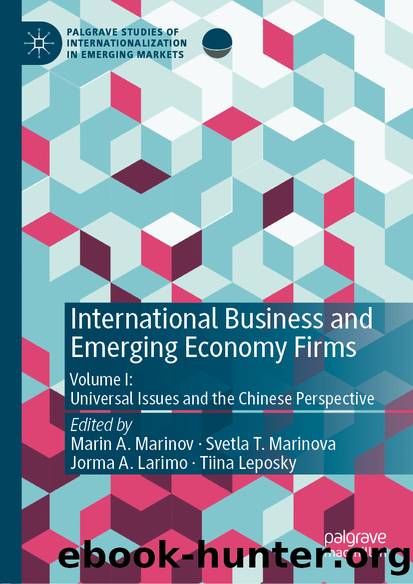International Business and Emerging Economy Firms by Unknown

Author:Unknown
Language: eng
Format: epub
ISBN: 9783030244828
Publisher: Springer International Publishing
Ethical Challenges in Emerging Economy Contexts
As mentioned earlier, common to emerging economy contexts is the lack of efficient formal institutions and the relative substituting importance of informal institutions regulating economic relationships. Thus, informal institutions play a key role in shaping ethical standards in these contexts. For instance, a review of the empirical literature on business ethics and ethical cultures in the BRICs nations (Ardichvili et al. 2012) reveals that business practices in all these four countries feature emphasis on informal and relational norms (e.g. Chinese guanxi , Russian blat), a situational/particularistic approach to ethical decision-making as well as orientations towards collectivistic and paternalistic values. These common characteristics are by no means associated to a common ethical foundation, yet the underlying diverse sociopolitical, religious and philosophical traditions found in these societies all seem to promote some form of hierarchy and collectivism as opposed to Western egalitarianism and individualism (Aycan et al. 2013; Ardichvili and Dirani 2017).
In such a historical context, a leader is expected to be the one with power and the one who has the responsibility and care for others. Research with focus on Asian contexts has particularly evidenced the influence of Confucian-inspired collectivist and hierarchical values on leader expectations and the effectiveness of certain leadership styles such as paternalistic leadership, ethical leadership and adjusted transformational leadership (Koo and Park 2018). In Latin America, Behrens (2010, 2013) similarly evidence the influence of the historical patriarchal networks on the legitimation of patriarchalism and the father-figure role expected of a leader. Meanwhile, emerging economies from the African continent such as South African, Kenya and Ghana are found to embrace indigenous leadership models valuing interpersonal relations, emotional attachments as well as a paternalistic character (Blunt and Jones 1997; Jackson 2016; Muyia and Nafukho 2017). While these leadership practices are often addressed in the mainstream Western-biased literature as carrying negative connotations, they perhaps deserve a more careful moral assessment taking into account the societal and historical context sustaining them (Aycan 2006).
Take paternalism for example. The Western critique tends to concentrate on the authoritarian character of paternalism underlying the idea of power and control residing with the individual leader and thus not desirable in a modern, egalitarian society (Jackson 2016). In contrast, a more emic view of non-Western leadership contexts equally emphasize a caring (benevolent) character and a moral character of paternalism as constituting what Aycan (2006) describes as the inherent “duality between control and care” (p. 453). Farh and Cheng’s (2000) conceptualization of paternalistic leadership based on Chinese insights can illustrate this duality. In a collectivist societal context, paternalistic leadership is a voluntary relationship where followers implicitly accept the unequal power distribution and in return expect the leader to fulfil his/her caring and protecting role. However, paternalistic relationships are bound to be personalized granting favours to some people over others, bringing about the challenge of in-group/out-group distinction and eventually discrimination. This tendency is indeed as universal as reflected in the simple cliché “power corrupts” (Ciulla 2005) almost regardless of context. Yet given the lack
Download
This site does not store any files on its server. We only index and link to content provided by other sites. Please contact the content providers to delete copyright contents if any and email us, we'll remove relevant links or contents immediately.
Zero to IPO: Over $1 Trillion of Actionable Advice from the World's Most Successful Entrepreneurs by Frederic Kerrest(4508)
Machine Learning at Scale with H2O by Gregory Keys | David Whiting(4292)
Never by Ken Follett(3937)
Harry Potter and the Goblet Of Fire by J.K. Rowling(3848)
Ogilvy on Advertising by David Ogilvy(3603)
Shadow of Night by Deborah Harkness(3356)
The Man Who Died Twice by Richard Osman(3072)
Book of Life by Deborah Harkness(2930)
The Tipping Point by Malcolm Gladwell(2911)
Will by Will Smith(2907)
0041152001443424520 .pdf by Unknown(2843)
My Brilliant Friend by Elena Ferrante(2824)
Purple Hibiscus by Chimamanda Ngozi Adichie(2822)
How Proust Can Change Your Life by Alain De Botton(2805)
How to Pay Zero Taxes, 2018 by Jeff A. Schnepper(2646)
Hooked: A Dark, Contemporary Romance (Never After Series) by Emily McIntire(2547)
Rationality by Steven Pinker(2352)
Can't Hurt Me: Master Your Mind and Defy the Odds - Clean Edition by David Goggins(2323)
Borders by unknow(2301)
